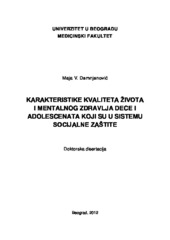Karakteristike kvaliteta života i mentalnog zdravlja dece i adolescenata koji su u sistemu socijalne zaštite
Characteristics of quality of life and mental health among children and adolescents in the social welfare system
Докторанд
Damnjanović, Maja V.Ментор
Lakić, AnetaЧланови комисије
Pekmezović, Tatjana
Leposavić, Ljubica
Nenadović, Milutin M.
Метаподаци
Приказ свих података о дисертацијиСажетак
Uvod: Kvalitet života je deo čovekovog mentalnog stanja, on je odraz njegovog
razvoja, društvenog i fizičkog okruženja i njegovog vlastitog položaja u tom
okruženju». Od posebnog značaja je paralelno praćenje i interakcije, kvaliteta
života i parametara mentalnog zdravlja, kod vulnerabilnih grupa, kao što su
deca i adolescenti u sistemu socijalne zaštite.
Cilj: Kod dece i adolescenata u sistemu socijalne zaštite odrediti: karakteristike
kvaliteta života, mentalnog zdravlja i prevalenciju mentalnih problema,
povezanost kvaliteta života i mentalnog zdravlja, razlike u karakteristikama
kvaliteta života i mentalnih problema u odnosu na decu iz bioloških porodica.
Metode: Istraživanje je obuhvatilo 216 dece i adolescenata iz sistema socijalne
zaštite. Kontrolnu grupu sačinjavalo je 238 dece i adolescenata iz opšte
populacije. Instrumenti korišćeni u ovom istraživanju su: Pedijatrijski upitnik o
kvalitetu života, upitnik Pretraga anksioznih poremećaja, Kratak upitnik o
raspoloženju i osećanj...ima, Upitnik o snagama i poteškoćama. Podaci su
obrađeni standardnim statističkim metodama.
Rezultati: Deca i adolescenti iz grupe dom imali su statistički najniže skorove
na svim skalama PedsQL upitnika, kao i ukupan skor u odnosu na ostale dve
grupe (P < 0,000). Ukupna prevalencija mentalnih problema je 67,6% u domu,
43,8% u hraniteljstvu i 37% kod dece u biološkim porodicama. Uticaj mentalnih
problema na kvalitet života je srednjeg do visokog stepena, d = 0,77 – 1,68,
najveći za depresiju u grupi dom, za eksternalizujuće probleme u grupi
hraniteljstvo.
Zaključak: Deca i adolescenti smešteni u domovima za decu bez roditeljskog
staranja imaju značajno niži kvalitet života od dece i adolescenata koji su smešteni u hraniteljskim porodicama...
Introduction: Quality of life is a part of man's mental state. It is a reflection of
its development, social and physical environment and its own position in that
environment. Of particular importance is the parallel monitoring of the
interaction parameters of quality of life and mental health in vulnerable groups
such as children and adolescents in the social welfare system.
Objective: In children and adolescents in the social welfare system to
determine: the characteristics of quality of life, the prevalence of mental health
problems, relationships between quality of life and mental health, and
differences in the characteristics of quality of life and mental health problems
between these children and children from biological families.
Methods: The study included 216 children and adolescents from the social
system. The control group consisted of 238 children and adolescents from the
general Serbian population. Instruments used were Pediatric Quality of Life
Inventory (PedsQL), Screen ...for Child Anxiety Related Disorder (SCARED),
Mood and Feelings Questionnaire Short (SMFQ), Strenghts and Difficulties
Questionnaire (SDQ). Data were analyzed using standard statistical procidures.
Results: Children and adolescents from the residential care system had the
lowest scores on all PedsQL scales (P <0.000). The overall prevalence of mental
health problems among the subjects was 67.6% in the residential care, in the
foster care 43.8% and 37% in biological families. The impact of mental health
problems on quality of life had a medium to high degree (d = 0.77 - 1.68), the highest for depression in the residential care and externalizing problems in the
foster care...



